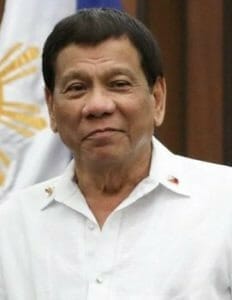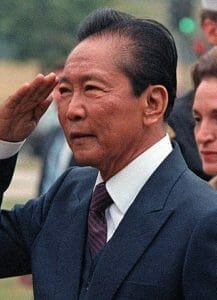Since coming to power in 2016, Rodrigo Duterte’s Philippines has experienced a bloody war on drugs that has left over 5,000 people dead; the targeting of political opponents; crackdown on free media; martial law in the southern island of Mindanao; and attempts to rewrite the constitution. Duterte’s government has been moderately kept in check by the opposition-controlled Senate until now. However, the May 22 final midterm election results show that the President’s allies have won all 12 of the seats in the 24-member Senate that were up for election. With the Senate now under his control, checks and balances on the presidency will be severely weakened. With little opposition to block his desired legislative agenda, Duterte now has a clear path forward to implement his most desired policies.
Bringing Back the Death Penalty
One practice Duterte is eager to reintroduce to the Philippines is the death penalty. Capital punishment was made illegal in the Philippines in 1987, then it was reinstated in 1993 and abolished again in 2006. Duterte has been trying to have the death penalty reinstated since he became president in 2016, mainly to aid his ‘war on drugs’. Multiple bills supporting this cause have passed the lower house since then but have stalled in the Senate.
However, with most of the opposition gone now, Duterte has a fresh chance to reintroduce the issue. Nevertheless, a survey conducted by the Philippines’ Social Weather Stations – the main public-opinion polling body of the country – showed that public support for the death penalty in relation with drug-related offenses was actually quite low. Six out of seven drug-related offenses received less that 33% support for the death penalty – instead, over 50% of respondents said they believed life imprisonment was the appropriate punishment.

President Rodrigo Roa Duterte. the 16th and current President of the Philippines. Photo: Wikimedia Commons
Bringing back of the death penalty would, in fact, not make the drug problem go away or even improve. Supporters claim it will de-incentivize poor people from joining gangs and dealing drugs, but this is simply not true. It will only translate into more overpopulated prisons with people waiting on death row, more preventable deaths, more angry families, and a maintained high crime rate. In fact, there is a consensus among criminal justice and sociologist communities that the death penalty does not deter crime.
Moreover, according to the UN, carrying out the death penalty for drug offenses amounts to a violation of international law and such deaths are considered unlawful killings. It also does not deter the distribution of drugs since those caught are usually at the very bottom of the organized crime food chain. As such, it appears that the death penalty for drug offenses is mainly targeting the most marginalized in society. A far cry from Duterte’s original promises of helping the poorest and weakest Filipinos achieve a better life and brighter future.
Reducing the Age of Criminal Liability
Along with bringing back the death penalty, Duterte has also voiced his plans to lower the age of criminal liability from fifteen to as young as nine years old. It is bad enough that teenagers can get arrested and be targeted for their ‘role’ in the drug cycle, but to be able to legally go after children represents an entirely new low for the country’s justice system. Children get caught up with gangs due to poverty and lack of better opportunities. If children are the future of a country, then what kind of future would the Philippines have if it starts arresting any child ‘suspected’ of drug-related crimes?
Moreover, legally speaking, this would constitute a grave violation of children’s rights. The Philippines is a signatory of the Convention on the Rights of the Child which states in Article 33 that
States Parties shall take all appropriate measures, including legislative, administrative, social and educational measures, to protect children from the illicit use of narcotic drugs and psychotropic substances as defined in the relevant international treaties, and to prevent the use of children in the illicit production and trafficking of such substances [emphasis added].
As such, rather than arresting these children and ruining their futures, the government must fulfill its duty of protecting them from such substances in the first place.
Revising the Constitution
Finally, Duterte has expressed his desire to change the constitution to turn the country into a decentralized federal republic which would give regions more autonomy and boost economic growth. The aim is to allow other regions greater political and taxing powers to decentralize socio-economic power away from Manila and distribute it more evenly throughout the country. The proposed republic would have eighteen federal regions, each with a governor, regional assembly and regional Supreme Court.
However, some fear this move is but an excuse to amend presidential term limits – currently at one six-year term – curb rights on freedom of speech, and abolish the position of vice president (the current one is the leader of the opposition party). Surveys show an overall 37% support among the public for a federal system while 34% remain undecided and 29% disagree. Support is, thus, not very high. The question remains, however, if Duterte will pull a Xi Jinping move and extend his term indefinitely.
A Return to the Marcos Years?

Philippine President Ferdinand Marcos in 1982. To this day, Marcos remains widely popular among many Filipinos. Photo: Wikipedia Commons
With all these recent developments, there seems to be a sense of déjà vu in the air. Many Filipinos see Duterte as a hero and pledge complete loyalty to him; comparable to the popular support former president Ferdinand Marcos enjoyed. To this day, Marcos remains widely popular among many Filipinos, despite having been overthrown by a popular uprising in 1986 after he amended the Constitution and surpassed his term limit. His son, Bongbong Marcos, narrowly lost the vice-presidential election in 2016 by 0.09% – a testament to the ongoing popularity of the Marcos family. His sister, Imee Marcos, was endorsed by Duterte and won a senatorial seat during the last midterm elections. Like Marcos once did, Duterte’s government also enjoys large popular support – 72%, the highest among any previous administration.
Filipinos thus seem to have a love-hate relationship with strongmen leading the country. Duterte is following in the footsteps of Marcos through his unprecedented public support and iron grip over the country. The question is, however, if Duterte will suffer the same fate as Marcos after revising the Constitution. Duterte has said multiple times he wishes to resign before his term ends. Still, even if he does not seek reelection under the new Constitution, he would remain chairman of the planned ‘Transition Committee’ until the shift to federalism is completed. This might well drag on beyond his 2022 term limit.
True Powers Comes From Trust
It would do the president good to look at those who came before him, especially the all-popular Marcos, and learn that true power lies in the trust the people have in their leader. If that trust is broken, this president too shall suffer a dishonorable exit from public service.
Gabriela Bernal
* Opinions expressed in this article are the author’s own and do not necessarily reflect FORSEA’s editorial stance.
Sources:
Amnesty International. “A CLEAR SCIENTIFIC CONSENSUS THAT THE DEATH PENALTY DOES NOT DETER” https://www.amnestyusa.org/a-clear-scientific-consensus-that-the-death-penalty-does-not-deter/
Harm Reduction International. (2019). The Death Penalty for Drug Offences: Global Overview 2018. https://www.hri.global/death-penalty-drugs-2018
OHCHR. (2015). Using the death penalty to fight drug crimes violates international law, UN rights experts warn World Day Against the Death Penalty. https://www.ohchr.org/EN/NewsEvents/Pages/DisplayNews.aspx?NewsID=16581&LangID=E
Social Weather Stations. (2018). Survey on death penalty: https://www.sws.org.ph/swsmain/artcldisppage/?artcsyscode=ART-20181010122553
– – –. Survey on federal system of government: https://www.sws.org.ph/swsmain/artcldisppage/?artcsyscode=ART-20180629205742
— — —. Survey on the national administration’s popularity: https://www.sws.org.ph/swsmain/artcldisppage/?artcsyscode=ART-20190503210103

